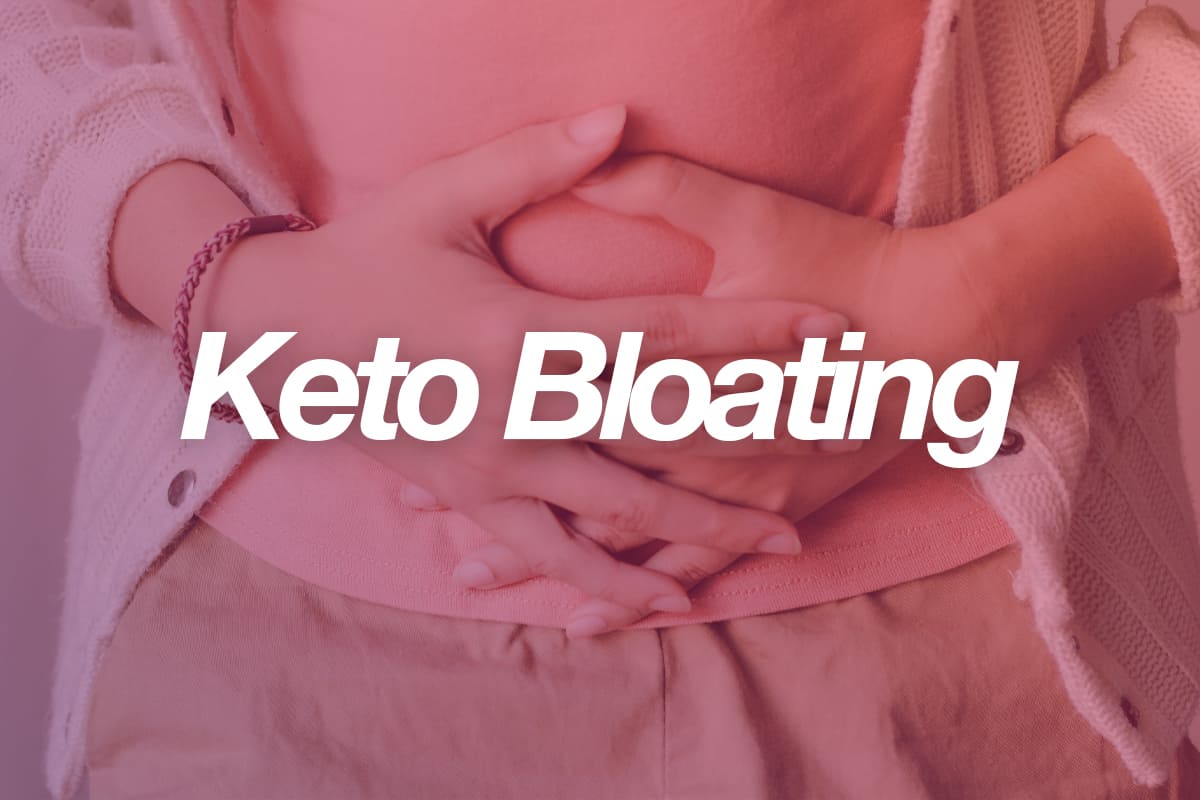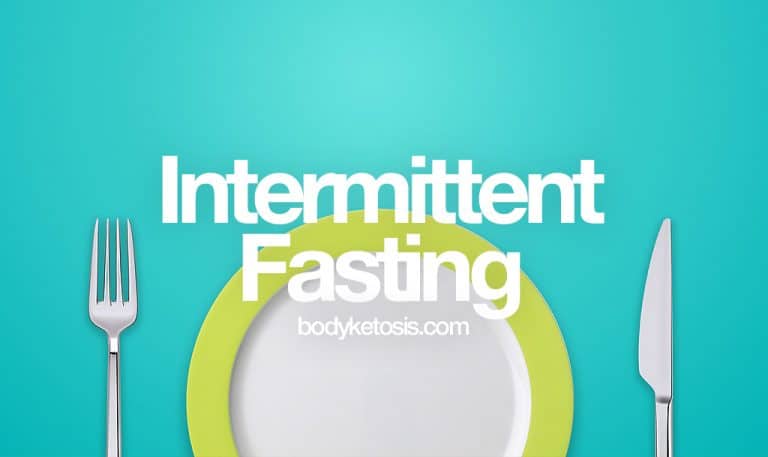9 Reasons You Are BLOATED on Keto (+How to Deal With Each)

Keto bloating is a common side-effect during the keto diet that most of us will experience at some point in time.
There are many reasons why your stomach may be bloating up like a balloon, but most of them are related to your body adapting to new foods and habits.
Common Reasons for Keto Bloating
1. First Week(s) on Keto
Bloating on the first week(s) of keto is common and happened to many of us.
In order to start burning fat, your body needs to adapt and enter into ketosis. This initial adaption period is called the keto flu or the “carb withdrawal from hell.”
If you are feeling bloated on keto and constantly exhausted, then you are most likely experiencing the side effect of keto flu. (1)
Both of which are normal side effects during this adjustment period. The keto flu can last about a couple of weeks until your body is adjusted to ketosis.
How to Deal With it
- To stop keto bloating and keto flu, increase your sodium, potassium, and magnesium intake by drinking bouillon, bone broth, or taking electrolytes.
- Up your fat intake with fatty foods and MCT powder.
- Strictly keep your daily carb intake under 20 grams. Make sure you are not eating hidden carbs through condiments and sweeteners.
2. Cheating With Carbs
One of the most common reasons you might be bloated on keto is eating too many carbs, either knowingly or unknowingly.
In order to stay into ketosis, your daily carb intake needs to be below 20-50 grams and that “one donut” or whatever else treats will most likely break that. (1)
The fact is that during keto, there cannot be any cheating with carbs, or you will always be experiencing a keto bloating period with the keto flu.
Another reason can be hidden carbs from condiments and prepackaged low-carb foods. For example, make sure your ketchup doesn’t contain any carbs.
How to Deal With it
- Make sure you aren’t eating any hidden carbs through condiments or other foods. Recheck labels for nutrient info.
- Avoid cheating with carbs during keto 100%. There cannot be any exceptions.
- If you have cheated, cut out carbs again below 20 grams a day and increase your electrolyte intake to minimize the keto flu side effects.
3. Consuming too Much MCT Oil
Medium-chain triglycerides (MCTs) are a valuable tool that can speed up ketosis but can also cause bloating on keto.
MCT oil bloating is common among beginners as your body is not used to digesting MCTs. Keto bloating usually happens when consuming MCT oil in larger quantities.
Some of the most common MCT oil side effects are loose stools, diarrhea, gas, and bloating. (2)
So if you are new to MCTs or experiencing some stomach distress, start with low doses or decrease your current doses to allow the digestive system to adapt.
How to Deal With it
- When starting out, start with a low dose and increase slowly. Follow the manufacturers’ guidance on the package.
- When already experiencing stomach distress, reduce the quantity until your body is adapted.
- Consider using MCT powder instead of oil form. Also, the powder form doesn’t make drinks oily.
4. Consuming too Many Artificial Sweeteners
Another common reason for keto bloat is eating too many artificial sweeteners.
This is the most likely reason if you have a sweet tooth, as the majority of keto sweets or snacks are using artificial sweeteners like sugar alcohols.
Some of the most common sugar alcohols are Erythritol, Sorbitol, Xylitol, and Maltitol. (3)
Although these sweeteners are keto-friendly, they can cause bloating if you consume them too much.
How to Deal With it
- To get rid of keto bloat, avoid replacing sugary foods with low-carb alternatives.
- Avoid keto products, like Atkins or Quest bars, with sugar alcohols as the main sweeteners.
- Consider replacing “keto snacks” with MCT powder, which increases your fat intake and provides a feeling of satiety.
5. Food Intolerances
Keto bloating and gas are common symptoms of food intolerance, which means the digestive system has a hard time digesting certain food.
Food intolerance is also called food sensitivity, but it’s different from food allergy. Some of the most common types of food intolerance include lactose, histamine, and gluten. (5)
Unfortunately, there’s no cure for food intolerances. The best way to manage this situation is to avoid the foods that cause discomfort. (6)
How to Deal With it
- Use the “elimination method” to test which food might cause problems.
- Start keeping a food diary to track the foods, quantities, and symptoms (or lack of) each may cause.
- Visit a medical professional who can take appropriate tests to measure any potential intolerances or allergies.
6. Not Getting Enough Fiber
Lack of fiber in your men is a common reason for low-carb bloating.
Meeting your daily fiber needs is more challenging on keto because keto is a low-carb diet, while fiber itself is a type of carbohydrate.
The lack of fiber often leads to slower transit of food through the digestive system, resulting in increased fermentation and the production of excess gas, causing keto bloating.
How to Deal With it
- Eat enough low-carb fiber-rich foods, or consider taking a fiber supplement.
- According to the Food and Drug Administration, the daily target value for dietary fiber is 28g per day (on a 2,000-calorie diet). (7)
- Avoid eating fiber in excess quantities, which may also cause bloating.
7. Overeating Brassica Vegetables
Sometimes the reason you might be experiencing keto bloating is the simplest and obvious one: overeating foods that your body isn’t used to and, in turn, causing bloating.
Brassica vegetables are one such food group that not many of us eat regularly, but when we go on a diet, we tend to eat them A LOT.
Common brassica vegetables include brussels sprouts, broccoli, cauliflower, and kale.
The problem is that when you are introducing new vegetables in large quantities, your body isn’t simply used to it.
This, in turn, can trigger some digestive problems, including bloating up like a balloon.
How to Deal With it
- Consume fewer brassica vegetables until your body adapts.
- A keto bloating remedy is to make veggies more gut-friendly by cooking, steaming, or pureeing them.
- Consider replacing some of them with alternatives like ginger, zucchini, and asparagus.
8. Not Drinking Enough Water
If you are continuously bloated and not losing weight on the keto diet, you might be dehydrated instead.
The process of entering into ketosis causes your body to rapidly eliminate water from the body, which may cause dehydration. (1)
This happens because glycogen binds water in the body. When carb stores are depleted, glycogen levels drop, and water is excreted from the body.
Drinking plenty of water during the keto diet is essential in order to minimize the keto flu and bloating during keto.
How to Deal With it
- According to the National Academy of Medicine, an adequate intake of daily fluids of about 13 cups and 9 cups for healthy men and women. (9)
- In addition to drinking water, make sure to get enough sodium, potassium, and magnesium by drinking bouillon, bone broth, or by taking electrolytes.
- PS! When you eat more fiber, then you should also increase your water intake with it so your body can properly digest it.
9. Gut Flora Imbalance
Another reason for low-carb bloating is gut flora imbalance, as your gut culture is changing by fighting a hard fight.
Your gut, sometimes called your second brain, is a home for healthy bacteria that keep your digestive system working.
Big dietary changes, like the keto diet, can upset this fragile ecosystem and cause different gut problems, and you end up feeling bloated on keto.
After starting keto, it takes time for your gut’s bacteria to adjust to new foods, but you should support the change with foods that support the development of new gut cultures.
How to Deal With it
- The easiest way to stop bloating on the keto diet and restore balance with good bacteria is with probiotics.
- Restore balance with good bacteria by eating low-carb natural yogurt, kefir, sauerkraut, tempeh, kimchi, kombucha, miso, and pickles.
- Make sure all probiotic foods are low-carb, as often these foods have added sugars in them.
FAQ
Why am I bloated on keto?
The most common reasons for keto bloating include keto flu, eating too many carbs, or lack of fiber. In most cases, it’s a normal side effect, as it takes time for the body to adapt to the ketogenic eating style.
How long does keto bloat last?
The length of the keto bloat depends on the reason you are experiencing bloat. If the cause is body adaption to certain foods, then it should take around a couple of weeks. If it’s caused by eating excess supplements, sweeteners, or dehydration, then bloating will stop when the source of the problem is eliminated.
How to get rid of bloating on keto?
The easiest way to get rid of bloating is to eat and drink enough fiber and water, support the keto adaption process with probiotics and electrolytes, and avoid excess MCT oils, sweeteners, and foods that might cause intolerance.
Does keto make you gassy?
Keto diet can make you gassy, but not everyone experiences it. The most common reasons for keto gas include lack of fiber, not drinking enough water, and eating too much sugar alcohol, or MCT oils.
Does keto bread cause bloating?
In most cases, keto bread by itself isn’t the source of keto bloating, but it can act as a co-cause. Common reasons for bloating include eating too many carbs, MCT oils, sugar alcohols, lack of fiber, or even dehydration. Keto bread should not cause bloating if your daily carb intake is low and the bread doesn’t contain excess sugar alcohol, or MCT oils.
Sources
- Healthline. 2023. The Keto Flu: Symptoms and How to Get Rid of It. Link
- Forbes Health. 2022. What Is MCT Oil? Benefits And Side Effects. Link
- Cleveland Clinic. 2021. What You Should Know About Sugar Alcohols. Link
- Cleveland Clinic. 2023. Food Intolerance. Link
- MedicalNewsToday. 2020. What is food intolerance? Link
- U.S: Food & Drug Administration. 2023. Interactive Nutrition Facts Label. Link
- Harvard T.H. Chan. 2023. The Nutrition Source. Link

Alex is the founder of Bodyketosis, an author, low-carb enthusiast, and a recovering chubby guy who reclaimed his health using the ketogenic lifestyle. The need for the keto life began after his aunt and cousin were diagnosed with type 2 diabetes and he was next in line. Through personal experience and extensive scientific research, Alex offers insightful tips for everything keto.


![Detailed Beginners Guide to Keto Diet [Meal Plan Included]](https://bodyketosis.com/wp-content/uploads/2019/04/what-is-keto-diet-768x457.jpg)

![Camping on Keto 101 [My BEST Tips to STAY in Ketosis]](https://bodyketosis.com/wp-content/uploads/2018/09/keto-camping-101-768x457.jpg)
![3 Causes for HORRIBLE Ketosis ‘Body Odor’ [And How to FIX Them]](https://bodyketosis.com/wp-content/uploads/2018/09/ketosis-body-odor-1-768x457.jpg)
![How to STOP Keto Headache Fast [And Why it Happens]](https://bodyketosis.com/wp-content/uploads/2018/12/keto-headache-1-768x457.jpg)
